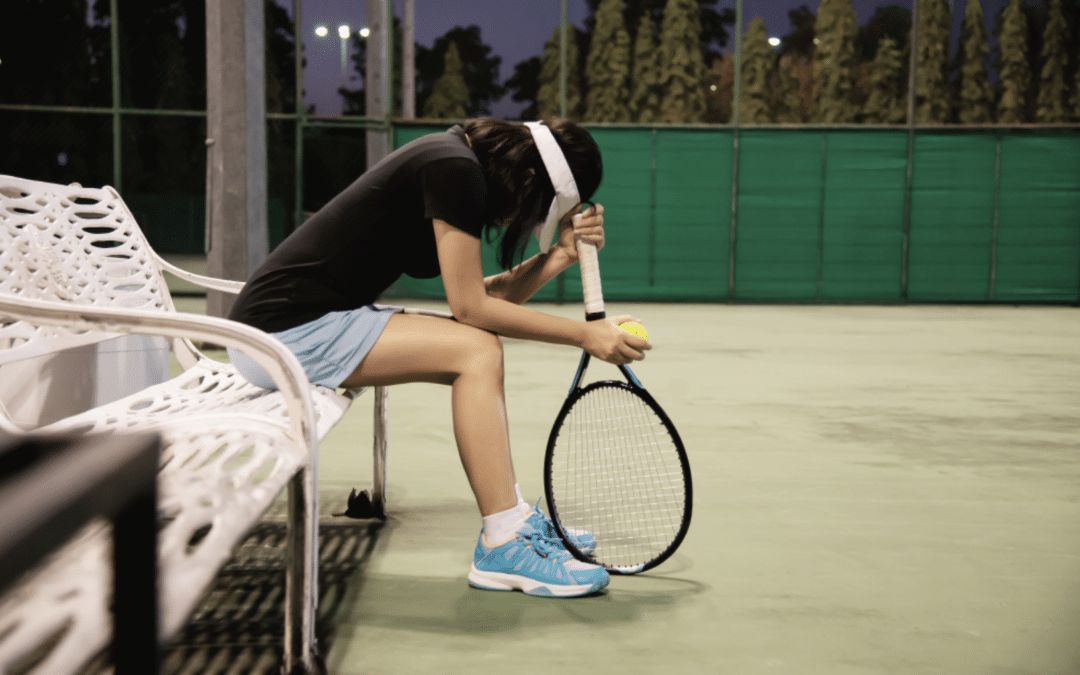Obviously, it’s never fun to fail, which in tennis means missing a shot, losing a game, set or even the whole match. The biggest underlying fear I have, looking at my career in retrospect and now working as a mental skills coach is that I don’t want to look incompetent to myself and to those I care about (coaches, parents, teammates, etc.). This is a very common fear among my clients as well.
In order to protect our ego, we go to enormous lengths to “save face”. We show signs of disgust either verbally or non-verbally with slouched shoulders and hanging head. I interpret this as a way for us to signal to everyone, including ourselves, that we already know this was bad, so nobody has to tell me. None of us want to be told we’re not good enough, least of all by somebody else!
The most extreme form of this is what we call “tanking” in tennis–players just stop trying. It’s an easy way to protect our ego because we can always claim that if only we had tried really hard we wouldn’t have lost that match. Been there, done that, unfortunately.
So how can you deal with the possibility that no matter what you do, however well you play, you still might lose and be told you’re not good enough? How are you supposed to feel if you were not competent enough to handle your opponent and the pressure, especially when it’s someone who is ranked closely to you?
There are a few techniques that would have helped me and now help my clients:
- Work on understanding that your on-court performance has nothing to do with who you are as a person. This can be especially hard for juniors, college and pro players who get rewards (scholarships, praise, prize money based on results). Try this exercise: Write down the reasons why you would want to be your own friend. This sounds weird, I know. But the point is that you have other qualities that make you likable and successful other than your ability to play tennis. Ask your best friend to tell you (Tip: don’t ask the person who just showed up in your life after you won a Grand Slam).
- Seek out other “failures” in your life that you take in stride. Took the wrong turn on your way to the grocery store? Cracked an egg and the yolk broke? Notice how you react to “failure” in other areas of your life and copy that behavior when missing a ball. At the end of the day, missing a forehand has just as much gravity as breaking the yolk in the greater scheme of things.
- Watch very young kids deal with “failure”. I was in awe of my little niece learning to stand. Over and over she fell on her butt. However, she kept at it and learned from her mistakes. To see what I mean, watch this little video.
Work on keeping Beginner’s Mind. This is a concept from Buddhist philosophy that I have embraced deeply and that would have helped me tremendously in my career! - Having Beginner’s Mind means to acknowledge that no moment in your life is like any other before. Every moment is new and cannot be compared to anything that has happened prior. This attitude allows us to see everything with “fresh eyes” and opens up new possibilities about how we might tackle a problem. We only judge behaviors based on past information, so if I see each mistake as a new occurrence I’m less likely to project catastrophic outcomes for it.
As I always stress, none of these strategies work if you’re only doing them once. Pick one or two (excluding the video) and write down your thoughts. Re-read them often. Trust me, it will be worth it!
Originally posted on https://meikebabel.com/the-fear-of-failing/

